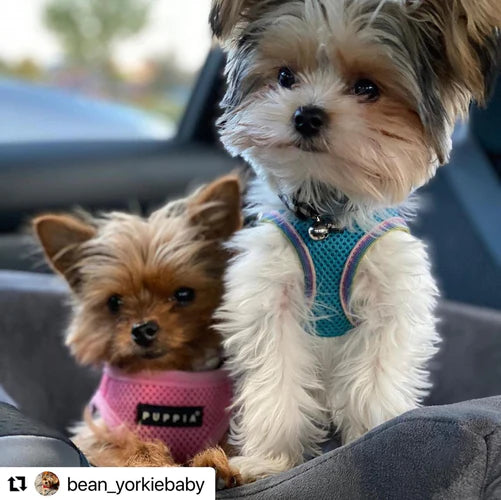Everything You Need for Your New Puppy

Puppies are four-legged companions in the making. They are fur-covered balls of energy that steal your heart. When you bring your new puppy home, you want your relationship to get off on the right paw. Whether it's your first puppy or your fifth, you'll want to ensure you have everything you need for your new pup.
Here's a new puppy checklist of things you'll need to welcome your new best friend home.
Crates and Gates
The world can be a scary place for puppies. It's big and full of unknowns. That's why a crate (and a waterproof crate pad) is a great investment. It's an enclosed space where they can feel safe whenever the world gets to be too much.
Many pet owners may not feel that crate training is necessary. But placing your pets in crates when you can't watch them doesn’t only protect your home. It also saves your four-legged friends from exploring areas where they might get hurt.
Be sure the crate is large enough for your pup to stand up, turn around, and lie down.
Gates should also be part of puppy-proofing a house. They can identify areas where puppies can safely explore and ensure they don't go where they shouldn't. Some gates are part of a system that creates a puppy playpen for indoor play. Just make sure the gates and sides are high enough that your energetic pup can't jump over them.
Food and Water
Every puppy needs separate bowls for food and water. But, with options ranging from simple plastic to personalized stoneware, how do you know which dog bowls to buy?
Bowls
If your puppy is a chewer, then plastic food and water bowls may not be the best option. But stainless steel bowls are durable and easy to clean. Also, make sure they have a nonskid bottom to prevent the bowls from sliding.
If your pup grows into an adult dog that likes to flip bowls, heavier bowls made of stoneware or ceramic may be needed. Some dogs inhale their food, which can contribute to digestion problems. Consider an anti-gulp or slow-feeding food bowl to counter rapid eating.
Older dogs or larger breeds may also benefit from elevated feeders. These feeders place less strain on a dog's neck and back. Check with your veterinarian to see if an elevated feeder would help your new dog.
Food
Finding the right dog food can be challenging. There are so many options. Breeders may provide you with a supply of puppy food to help transition your puppy to a different type of dog food, or you may decide to continue with the puppy food they are used to.
When selecting food for your puppy or new dog, select age-appropriate foods. Puppies have different nutritional requirements than adult and senior dogs. Giving your puppy adult foods can deprive them of needed vitamins and minerals for their development.
Remember, dogs have likes and dislikes when it comes to food. As puppy owners, try to find foods that your pups like and that are good for them.
Treats
Dog treats are often used in puppy training. They are used as positive reinforcement for listening and following instructions. During training classes, indulging your new pet with multiple treats is easy.
While rewarding positive behavior is a core component of dog training, it can result in overfeeding. As a pet parent, you need to select small, healthy treats to moderate the number of treats your new dog eats.
Potty Training
House training a puppy is the least favorite task for a new pet owner. While it does take time, it's not difficult as long as you are a consistent pet parent. To train puppies to go outside, keep the following in mind:
- Puppies can hold their pee for about an hour for each month of life. Depending on the age of your new best friend, your new family member may need to pee every two hours.
- Set a timer to ensure you provide plenty of opportunities for your new pup to go outside.
- Reward your pet for each success.
You may want to purchase puppy supplies such as pee pads. Use the pee pads to designate where puppies can go if they are indoors. Gradually, move the pee pads toward the door until they are outside. Eventually, your new companion will signal when they need to go outside.
Dog Beds
No matter how often dog owners are told not to let their pets sleep with them, they do it anyway. However, that decision doesn't mean you can skip buying a dog bed. Puppies need a place to sleep that is theirs alone. The truth is some dogs prefer to sleep on a pet bed or in a dog crate. That's why selecting the right bed for your pet is important.
Dog Beds should be large enough so your four-legged friend can stretch out entirely while lying flat. They should also be easy to clean because puppies can quickly become very dirty.
Larger breed puppies may prefer a flat orthopedic dog bed that makes stretching out comfortable. If your pup likes to sleep in a ball, you might want to consider a dog bed with cushioned raised sides to give them a nest-like feel.
12 Puppy Essentials
A new puppy checklist should include the following:
- A collar that identifies your pet.
- A harness if your dog pulls or has a squished face.
- A leash that provides control while walking. Retractable leashes do not provide the same level of control as a fixed-length leash. Ask a dog trainer for the best length for your dog.
- Poop bags for cleaning up after your pet.
- A grooming brush designed for your pet's coat.
- Nail clippers or grinding tools to keep nails short.
- Puppy shampoo. Human shampoos are designed for humans. Pets need organic moisturizing dog shampoos that are free from allergens. Many breeds are sensitive to fragrances added to human shampoos.
- Toothpaste. Puppy teeth need to be cleaned either by chewing or brushing.
- Microchips. Implanting a tag can help you locate your pet if it becomes lost.
- Vaccinations. Pets must be protected against diseases such as rabies, distemper, and parvo. Schedule an appointment with a veterinarian to keep your puppy safe.
- Puppy toys. Find toys that are safe for puppies. Adult-size toys can damage teeth and hurt a puppy's mouth and gums.
- Car seats. If you plan on having your dog ride in the car, consider a dog car seat that ensures protection in case of an accident.
With this guide to everything you need for your new puppy, you are off to a paw-perfect start in four-legged companionship.
At Animals Matter, we offer beds to meet the needs of dogs that prefer to stretch out on the floor and those that like to curl up in a ball. Also, our grooming essentials are safe for pets of all ages. Why not contact us to discuss your pet's needs?
Frequently Asked Questions
What are the different types of food you can feed your dog?
Dogs are not just meat-eaters. They can eat fruits and vegetables along with chicken, turkey, fish, eggs, pork, and beef. Carrots and green beans are good vegetables, and apples and blueberries are excellent fruits.
What are some of the items you will need for your new puppy?
You will need a bed, crate, collar, leash, bowls, food, and toys. In addition, you must have your new puppy checked by a vet and schedule vaccinations.
What is the most important thing to remember when introducing a new puppy to your home?
The world is big, and your home is unknown. Make sure you have a small space for your pup to explore that lets your pet feel safe.
Subscribe
Sign up to get the latest on sales, new releases and more…
Categories
- How to Get a Fearful Dog to Trust You: A Compassionate Guide for Rescue Dogs
- What Is Dog Boarding? A Complete Guide to High-End Stays for Your Dog
- Dog UTI Symptoms: How to Spot, Treat, and Prevent Urinary Tract Infections
- Psyllium Husk for Dogs: Science-Based Benefits, Dosage and Use
- Dog Meal Prepping : A Complete Guide to Healthy, Time-Saving Homemade Meals
- Best Places to Take Your Dog on Vacation this 2026(USA Edition)
- Tails of Celebration: Working Dogs of the Lares Trek, A Silent Partnership In Peru
- 5 Easy Organic Christmas Recipes for Dogs: Simple Holiday Treats Your Companion Will Love
- The 6 Best Luxury Gifts for Your Dog This Christmas: Thoughtful Holiday Comfort That Truly Lasts
- Why Playtime Matters: The Benefits of Mental Stimulation and Playtime with Your Companion
- Tails of Celebration: The Miao Dog-Carrying Festival - A Hero's Honor in China
- A Dog-Friendly Thanksgiving 2025: Comfort, Calm, and Easy Treat Recipes
- The Best Dog Beds for Winter 2025: 5 Luxury Styles for Warmth, Comfort & Orthopedic Support
- Tails of Celebration: The Feast of Saint Hubert — Belgium's Timeless Blessing
- Halloween Safety Tips for Dogs: How to Keep Your Companion Safe This Spooky season
- Tails of Celebration: Día de los Muertos / Day of the Dead for Pets, A Festival of Memory in Mexico
- How to Care for Senior Dogs in Fall: Mobility Tips & Joint Support
- Tails of Celebration: Kukur Tihar & The Tihar Festival of Nepal
- What is a VDI Testing for dogs ? : Insights, Procedures and Preventive Measures
- Cheap Dog Beds vs. Luxury Dog Beds: The Real Cost of a $50 "Disposable" Dog Bed
- Can Dogs Have OCD? Understanding Canine Compulsive Behaviors (CCD)
- Does My Dog Like Music? Find Out What Tunes Make Your Pup Wag!
- Effective Solutions for Food Aggression in Dogs
- 7 Frozen Treats Your Dog Will Love This Summer☀️🧊🍉
- The Best Waterproof Liners for Dog Beds: Protect Against Spills, Drool, and Accidents
- How to Cope with the Loss of a Dog: A Tribute to Every Companion We Carry in Our Hearts
- Top Tips on How to Prevent Matting in Dogs
- Understanding and Managing Dogs with Hip Dysplasia
- The Ultimate Guide to Dog Gut Health: Natural Remedies, Probiotic Insights and Signs of Poor Gut Health
- The Best Supplements for Dogs: Explore Top Picks for Canine Health and Wellness
- How Often Should I Brush My Dog's Teeth? Tips for Optimal Canine Dental Health
- Ultimate Guide on How to Comfort Your Dog During Fireworks this 4th of July
- Managing a Blowing Coat: Essential Grooming Tips for Double-Coated Dogs.
- 5 Daily Habits That Boost Your Dog’s Long-Term Wellness
- Mastering Crate Training a Dog: Tips and Benefits
- Dog Car Seats vs. Seat Covers: What’s The Best Option For Your Companion?
- Best Outdoor Dog Beds: Luxury, Durability, and Unmatched Comfort
- Is My Dog Overweight? Tips to Assess and Help Your Companion
- The Best Faux Fur Dog Beds for Ultimate Pet Comfort of 2025
- Dog Running Guide: How to Start, Train & Stay Safe when running with your Dog
- Indestructible Dog Beds? The Truth Behind the Term
- Top Tips for Effective Exercise for Dogs
- Effective Dog Ear Cleaning: A Step-by-Step Guide for Maintaining Healthy Ears
- How to Manage Dog Aggressive Behaviors: Expert Tips and Advice
- Effective Canine Ear Infection Remedies: Symptoms, Causes & Treatments
- How to Make a New Dog Comfortable in Their New Home - 2025 Guide
- Signs of Dog Allergy Symptoms and How to Help and Prevent Them
- Why Does My Dog Lick Their Paws? Causes and Solutions Explained
- Dog Alzheimer's: Symptoms, Causes, and Treatment Options
- The Legacy of Comfort with the Iconic Animals Matter® Ortho Companion-Pedic® Puff Luxury Dog Bed


Leave a comment
Please note, comments must be approved before they are published